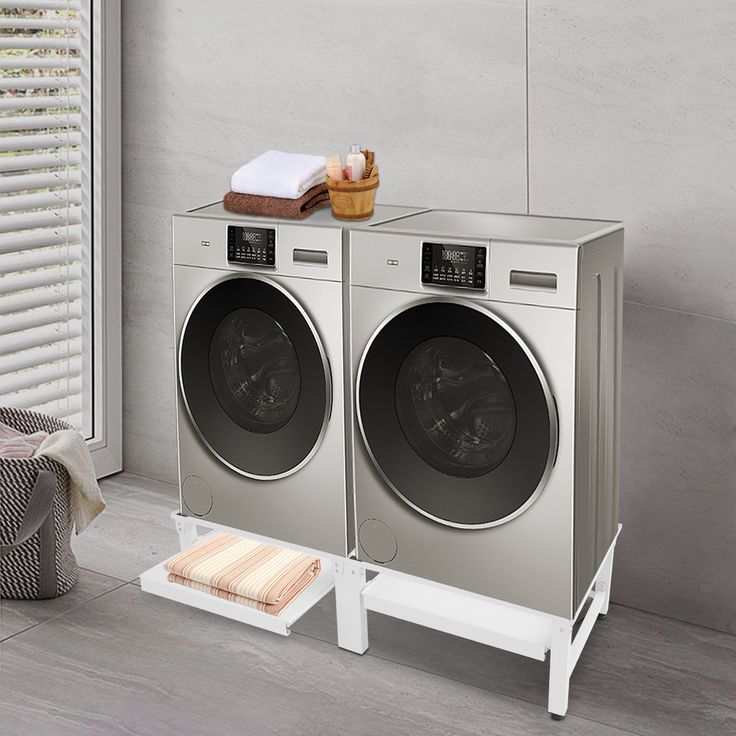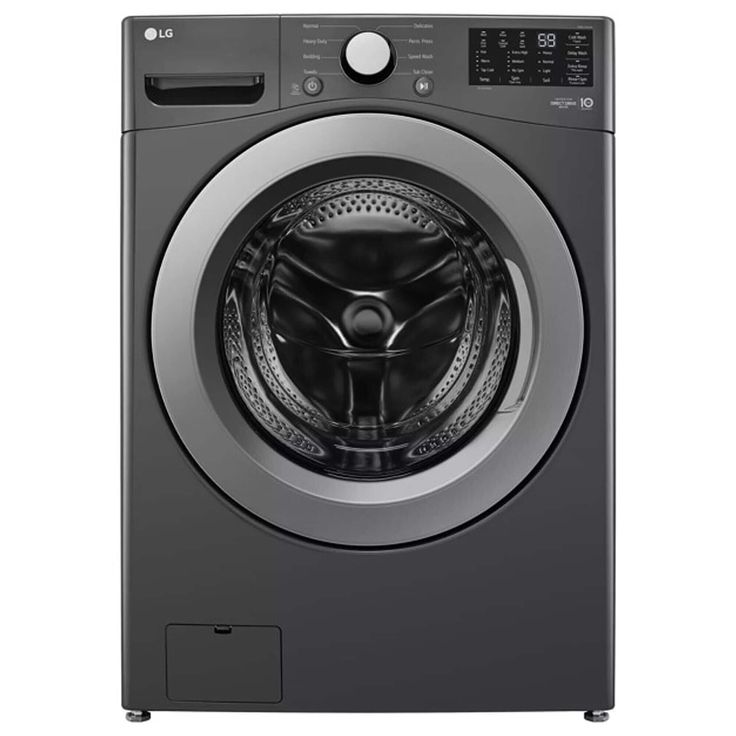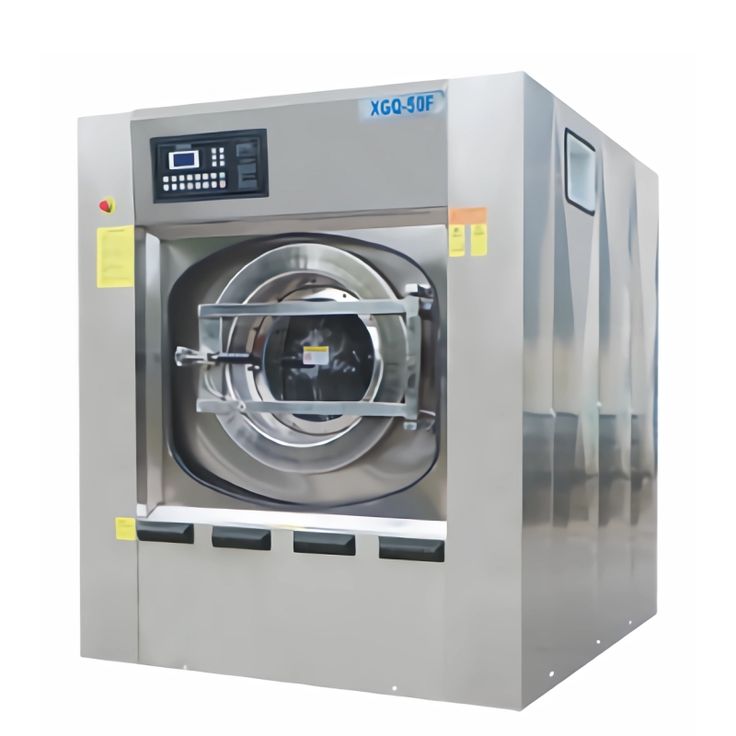Introduction to Industrial Washing Machines
Industrial washing machine is essential for businesses that require large-scale laundry processing. They efficiently handle heavier loads, cater to specialized needs, and ensure optimal performance in demanding environments. From hospitals to hotels, these machines deliver reliable and consistent results, making them invaluable assets for commercial operations.
What Are Industrial Laundry Machines?
Industrial washing machines are heavy-duty appliances specifically designed for commercial or industrial use. Unlike domestic washers, which often accommodate smaller loads, industrial machines have significantly larger capacities. They can process substantial volumes of laundry in a single cycle, making them ideal for businesses with high laundry demands.
Key characteristics of industrial laundry machines include:
- High-Efficiency Washing: These machines can wash large quantities of laundry quickly and effectively, significantly reducing the time needed for each load.
- Durability: Built to withstand frequent and heavy use, industrial washing machine boast robust construction. They can endure the wear and tear associated with continuous operation in commercial settings.
- Specialized Settings: Many models come with specialized programs designed for various fabrics and industries. This versatility ensures that all types of laundry receive the appropriate care, enhancing longevity and cleanliness.
Overall, industrial washing machines play a vital role in ensuring hygiene, speed, and cost-effectiveness for businesses, making them an essential component of modern commercial laundry operations.

How Do They Differ From Domestic Models?
Industrial machines are vastly different from domestic washers in functionality and construction. The primary distinctions include:
- Load Capacity: Industrial machines can handle loads 5 to 10 times larger than home models.
- Build Quality: They use robust materials for longevity and heavy-duty performance.
- Washing Cycles: Industrial models offer advanced cycles tailored to specific needs, such as sanitization.
- Energy Efficiency: These machines optimize energy and water use, reducing operational costs.
- Continuous Use: They are engineered for extended operation without overheating or frequent breakdowns.
These differences make industrial washing machines indispensable for commercial scalability and efficiency.
Key Features of Industrial Laundry Machines
Industrial washing machines are designed to meet the high demands of commercial operations. They offer a range of features that enhance efficiency, reliability, and sustainability.
High Load Capacity
Industrial washing machines can handle significantly larger loads than regular washers. They are tailored for businesses needing bulk laundry processing. Key benefits of high load capacity include:
- The ability to wash 5 to 10 times more laundry per cycle.
- Improved efficiency for facilities like hospitals and hotels.
- Reduced downtime due to fewer cycles needed.
This capacity ensures businesses can meet deadlines while reducing operational bottlenecks.
Advanced Washing Cycles
Industrial washers come with advanced cycles for specific needs. These cycles cater to diverse materials and industries. Some examples include:
- Sanitization settings for healthcare environments.
- Gentle cycles for delicate fabrics in textiles.
- Heavy-duty cycles for manufacturing operations.
These customizable options improve washing effectiveness and ensure safety for specialized materials.
Energy Efficiency and Sustainability
Energy efficiency is a critical feature of industrial washing machines. They are designed to minimize power and water consumption. Benefits include:
- Lower utility costs for long-term savings.
- Reduced environmental impact through optimized resource usage.
- Compliance with sustainability goals and industry regulations.
These machines enable businesses to operate efficiently while being eco-conscious.

Benefits of Using Industrial Laundry Machines
Industrial washing machines offer multiple advantages for businesses. They improve efficiency, reduce costs, and streamline operations. These machines are essential tools for large-scale laundry processing.
Cost-Effectiveness for Large-Scale Operations
Industrial washing machines help businesses save costs in bulk laundry processing. They handle larger loads in fewer cycles, reducing water and energy consumption. Lower utility expenses mean significant savings over time. Additionally, their advanced features ensure optimal resource use, minimizing waste. For industries like healthcare and hospitality, cost efficiency is crucial for operations.
Enhanced Durability and Reliability
Durability is a key advantage of industrial washing machine. Built with high-quality materials, they withstand continuous heavy use. Their sturdy design reduces the risk of breakdowns and operational disruptions. Features like robust motors and reinforced drums ensure reliable performance. This longevity prevents frequent replacement costs, making them a wise investment for any industry.
Reduced Labor and Time
Industrial washing machines simplify laundry processes, saving time and labor. Their high load capacity reduces the number of washing cycles needed. Automated settings and faster cycles further streamline work. Employees can focus on other tasks while machines handle laundry efficiently. Businesses can achieve faster turnaround times and boost productivity effortlessly.
Popular Applications of Industrial Washing Machine
Industrial washing machines are used across many industries that require fast and high-volume laundry processing. Their advanced features provide unmatched efficiency, making them indispensable for a range of operations.
Hospitals and Healthcare Facilities
Hospitals and healthcare facilities rely heavily on industrial washing machine. These machines are crucial to maintaining hygiene and sanitization standards. Key benefits include:
- Sanitization Cycles: Industrial machines eliminate harmful pathogens, ensuring safe and clean linens and uniforms.
- Large Capacity: They process bulk loads of bedding, gowns, and towels in fewer cycles.
- Compliance: These machines help meet stringent healthcare regulations for cleanliness.
In such settings, reliability and performance are non-negotiable. Industrial washing machines ensure operations run smoothly and hygienically.

Hotels and Hospitality Industry
In hotels and the broader hospitality sector, clean linens are central to guest satisfaction. Industrial washing machines offer the following advantages:
- High Efficiency: They handle large volumes of sheets, towels, and uniforms quickly.
- Customizable Cycles: Settings can cater to different fabric types, preserving quality.
- Energy Savings: Hotels benefit from reduced water and energy consumption, lowering operational costs.
These machines help hotels and resorts manage laundry demands efficiently, maintaining high standards of cleanliness.
Manufacturing and Textile Industries
Manufacturing plants and textile industries also depend on industrial washing machines. Their robust features meet demanding production requirements. Key advantages include:
- Heavy-Duty Cycles: These machines can handle grease, dirt, and industrial residue effectively.
- Durable Design: Built to withstand the rigors of daily use in a factory setting.
- Versatility: Suitable for cleaning textiles, uniforms, and other industrial fabrics.
For these industries, industrial washing machines are essential to maintaining a clean and safe workplace.
Considerations When Choosing an Industrial Washing Machine
Choosing the right industrial washing machine is critical for efficient operations. Several factors must be evaluated to ensure the machine fits your business needs.
Machine Size and Capacity
The size and capacity of an industrial washing machine directly impact its effectiveness. Key considerations include:
- Load Requirements: Choose a machine that matches your daily laundry volume.
- Space Availability: Ensure the machine fits the available floor space.
- Future Growth: Consider how future demand might affect your capacity needs.
A machine that is too small for your operations can lead to inefficiency. Oversized machines may waste resources and increase costs.
Maintenance and Support
Proper maintenance and reliable support are essential for the long-term performance of industrial washing machine. When evaluating options, consider the following factors to ensure optimal functionality:
- Ease of Maintenance: Choose machines designed for easy cleaning and inspection. Simplicity in maintenance allows staff to perform regular checks without excessive effort, ensuring that any potential issues are discovered early.
- Support Availability: Verify that the manufacturer provides reliable customer service and efficient repair options. Quick access to technical support can minimize downtime, allowing your business to continue operating smoothly without lengthy interruptions.
- Durable Components: Look for machines constructed with sturdy materials that can withstand frequent use. High-quality components reduce the likelihood of wear and tear, leading to fewer repairs and longer-lasting equipment.
Investing in industrial washing machine with strong maintenance systems can prevent costly downtime and ensure that your laundry operations remain efficient and reliable. Prioritizing these aspects will lead to better performance and reduced operational costs in the long run.
Compatibility With Specific Industry Needs
Different industries require industrial washing machine that cater to their unique demands. Evaluating the machine’s features ensures compatibility with your specific needs.
- Sanitization Settings: Healthcare facilities prioritize sanitization. Machines equipped with advanced sanitization cycles kill pathogens effectively, ensuring hospital-grade cleanliness for uniforms and linens. This feature is crucial in maintaining hygiene standards.
- Fabric Care Options: Hotels have specific requirements for laundry care. They look for machines that offer customizable cycles for towels and linens. Adjustable settings help maintain the quality of fabrics while ensuring thorough cleaning and quick drying.
- Heavy-Duty Performance: Manufacturing plants often handle tough industrial residues. They prioritize machines with robust cycles designed for heavy-duty performance. These cycles efficiently tackle grease, oils, and other contaminants, ensuring that uniforms and equipment come out clean and ready for use.
Choose a machine that aligns with your industry requirements for optimal results. Customizable options can enhance efficiency in specialized applications.

Cost Analysis and Long-Term Investments
Understanding the costs and benefits of industrial washing machine is key for smart investments. Businesses must evaluate upfront costs, ongoing expenses, and potential returns over time.
Initial Purchase Costs
Initial costs depend on the size, features, and brand of the industrial washing machine. Key considerations include:
- Machine Type: Advanced models with extra features cost more but offer better efficiency.
- Capacity: Larger machines designed for bulk processing tend to have higher prices.
- Customization: Machines tailored for specific industries may involve elevated initial costs.
While initial expenditure might be high, it guarantees improved performance and long-term gains.
Operational and Maintenance Costs
Operational and maintenance expenses are significant when using industrial washing machines. Important factors to account for:
- Energy Costs: High energy efficiency is crucial for lowering operational expenses. Machines designed with energy-saving technology reduce electricity consumption, which results in substantial savings over time. This not only benefits the budget but also supports sustainability efforts.
- Water Usage: Water costs can add up quickly if not managed properly. Choosing machines designed for sustainability can minimize water usage without compromising cleaning performance. Efficient water management protects the environment and reduces utility bills.
- Maintenance Frequency: Regular upkeep is essential to prevent unexpected breakdowns. Frequent maintenance checks help identify potential issues early, reducing the likelihood of costly repairs. Developing a proactive maintenance plan keeps machines running smoothly.
- Replacement Parts: Investing in industrial washing machine with durable components lowers the frequency of part replacements. Machines built with high-quality materials often require fewer substitutions and repairs, leading to lower long-term costs.
By planning for these recurring costs, you can ensure smooth long-term operations without exceeding your budget. Proper management contributes to the overall efficiency and profitability of your laundry operations.
Return on Investment Over Time
Investing in industrial washing machines yields solid returns throughout the years. Various benefits contribute to this favorable outcome:
- Savings: Handling bulk loads significantly decreases utility bills. Businesses save on electricity and water costs, as these machines are designed for high efficiency. Additionally, reduced labor costs come from needing fewer staff members to manage laundry operations.
- Longevity: Durable machines are built to last longer, minimizing the need for replacements. A longer lifespan means businesses can avoid the substantial expenses associated with purchasing new equipment. This durability ensures a better return on the initial investment over time.
- Efficiency Gains: Faster washing cycles and precise features enhance overall productivity. Companies can process more laundry in less time, leading to improved workflow and higher output. This efficiency translates directly into greater profitability, as businesses are able to handle increased demand without incurring additional costs.
The initial investment and operating costs are offset by lower expenses and increased output. Businesses achieve higher profitability by optimizing laundry processes effectively.

Tips for Maintaining Industrial Laundry Machine
Proper maintenance ensures industrial washing machine run efficiently and last longer. Follow these guidelines to get the best performance.
Regular Cleaning and Inspection
Regular cleaning and inspection are vital to avoid machine breakdowns. Focus on these steps:
- Clean the Drum and Filters: Remove debris, lint, and residue daily.
- Check Hoses and Connections: Inspect for leaks, cracks, or blockages.
- Monitor for Wear and Tear: Identify worn parts early to prevent failure.
These practices reduce downtime and improve washing performance, saving costs in the long run.
Servicing and Upgrading Components
Timely servicing and component upgrades keep machines running at peak efficiency. Key actions include:
- Schedule Routine Servicing: Follow the manufacturer’s maintenance schedule for professional inspections.
- Replace Worn Components: Use high-quality replacement parts to ensure durability.
- Install Advanced Features: Upgrade software or add new components to improve functionality and efficiency.
Staying proactive extends machine life and boosts productivity.
Common Troubleshooting Practices
Quick troubleshooting minimizes disruptions. Address common issues with these simple steps:
- Resolve Drainage Problems: Check and clear clogged filters or drainage systems.
- Fix Performance Issues: Ensure proper water and detergent levels for optimal operation.
- Handle Power Failures: Verify electrical connections and avoid overloading the machine.
By tackling these problems promptly, businesses can maintain seamless operations and avoid costly repairs.